By Gabrielle.
This week’s tour is wonderfully wild and quite unlike any home we’ve seen. Situated on the outskirts of Nairobi, Erin‘s family home is made from unique, found materials smartly transformed into walls and doors, windows and tables, and even a chandelier. Daily visitors to her garden include monkeys and warthogs and, last year, lions. Yes, lions. I am officially in awe of the courageous life Erin leads, and the motivation that runs her super chic, community-empowering company, Toto Knits. Inspiring doesn’t seem a bold enough word for this one, Friends. Please enjoy it!
Q: You’re a brand new Kenyan citizen! Congratulations! Tell us how your life led you here.
A: Thanks! It’s a big thing for me as I’ve been here 11 years now and really feel it’s important that I’m official now.
While originally from San Francisco, I was living in New York working in the glitzy world of media. Think The Devil Wears Prada; I worked for Tina Brown. And then September 11th happened. I had an ‘aha’ moment as I was watching the towers fall and the subsequent walk back downtown to my apartment while people were running uptown, covered in ash, that I needed to do something more meaningful with my life.
By February 2002, I had found a job in Kenya working as the Director of Finance and Development for a school for children with special needs. It ticked all the boxes: doing a job that helped people, living in a new country, and working with kids. I immediately sold my apartment in the West Village and landed here a month later. I was going to go for a year and when I got back, I could use the old line ‘When I lived in Africa…’ at cocktail parties. Or so I thought.
Within ten days here I met my husband, Captain Africa, and as it turned out, Mr Right. We met over a toilet. I was living in a cottage on a giraffe sanctuary and it had no toilet, so they asked him to come quote for putting in a toilet. He over-quoted so that the owners wouldn’t build it, and I would move in with him. It worked!
A few years later and we had two ‘totos’ (children)!
Nina and Tor are now eight and six and go to the same school where their father went, and even have some of the same teachers. There is a real sense of community here; most of our neighbors have been family friends for generations and while my American accent makes me stick out, I’m thrilled my children can grow up as part of a community.
We live on a five-acre plot shared with my brother-in-law, his wife, and their twin babies. While I’m far from my family, the kids are constantly surrounded by cousins and grandparents. Their life is lived mostly outside; we have a big garden and a safe neighborhood where they can ride their bikes to friend’s houses.
We are on the outskirts of Nairobi between the Nairobi National Park and the Giraffe sanctuary, so we have a fair bit of action in the garden itself. Monkeys and warthogs are daily visitors, and we had lions using our garden as a thoroughfare all of last year. The kids were NOT allowed to bike to school or friends’ houses!
So eleven years later, I am thrilled to be a real American African and live this very unexpected life.
Q: Your home looks like something out of a tour guide. Can you tell us the story of how you built it and where it sits?
A: It’s not a typical house in Kenya, although I bet a lot of people think we all live in thatched roof houses with wonky walls! My husband, Jan, is a designer and built the house when he was 23, just before I met him. It was a bit of a bachelor pad so we enlarged the kitchen, and then added another bedroom and a laundry room.
He built the house on a shoestring budget. The walls are made from old fence posts and wire mesh filled with rubble from building sites, and the windows, doors, and cabinets are from recycled windows and doors from old coast houses. We re-sprayed an old bathtub for the kids’ bathroom, made our own from fiberglass, and got a tin bath made on the side of the road for the guest room. Our chandelier is made from the bottom of an old bucket chair, and the candle holders in it from old cocoa tins with rope hanging it from the ceiling. The dining table is made from an old cable reel and a metal base; the rest of the cable reel went towards making a chicken hutch.
The vision was to be green, but a lot of it’s also out of necessity. It’s all very much ‘you want it you make it’ here in Kenya. No IKEA to run to when you need a bookshelf or dining table or chair. We are lucky to have a workshop here and craftsmen to help make our visions come true.
We spend most of our time on the veranda, both as a family and for entertaining. There’s always some sort of action with the wildlife or even just watching the birds. At night, bush babies come down the tree and eat bananas off the little table we set up, and you can hear the hyraxes screeching and owls hooting.
Q: Describe Nairobi to us. What do you love most about living there? What are the challenges?
A: Living in a developing country is like living in the Wild West, which is both my favorite and least favorite thing about Nairobi! The positive is that there is so much opportunity – often to do things that have been done already elsewhere – but there’s a freedom that comes with not having too many limits. On the other hand, there are so many things lacking here: critical services like constant water and electricity, good roads, and police services, to name a few, but also more esoteric things like a rich cultural scene. I miss those elements of New York and San Francisco.
Q: What’s been the oddest or most uniquely Nairobi thing you’ve seen yet in your day-to-day life?
A: There are usually baboons on the road on the way to school, and I am terrified of them!
Q: How do you spend your days in this home?
A: Kids wake up at seven and have breakfast while I check my e-mails for a quick peek at what’s to come that day. We’re dressed and out the door at eight to get to school seven minutes later. I’m back by 8:30; there are usually a few mummies to say hi to and school work to look at so it’s rarely a drop and run. Back home to the office, which is a converted shipping container about forty feet from the house. I have two workshops and I have five ladies come to the one at home every day, so I say good morning and tell them what orders we have and check on their work from the day before. Jan, my husband, also works at home so he’s in his office by eight as well – about fifty feet away!
There are always people coming and going. And while it’s mostly business on weekdays, there are lots of drive-bys as well. It’s always a hive of activity.
While we are technically in Nairobi, we are really on the very edge, so the closest shopping centre is 15 minutes away. I’ll pop over there mid-morning, drop some knits at the other workshop, and get the groceries at the local shop. It’s a guarantee you’ll see at least a few people you’ll know so there’s lots of chat. It’s very a quaint and kind of run-down shop, but I love it because we have an account there and that feels very Little House on the Prairie to me! The people who work there are all very friendly and know what we like. On the other hand, because it’s such a small community you can’t go into the chemist without everyone knowing your business!
I normally get back home for lunch with my husband and his office employees, a casual affair but it’s nice to have a hot lunch and catch up on the veranda. Then I’m back to work till the first school pick-up. I get a nice hour alone with Tor; he seems to have a quota of words he has to say every day and takes advantage of this hour to say most of them. I run back to school for Nina and once home we have a snack and I try to pry information out of her about her day. One of the best traditions here is tea time, so we will pop round to someone’s house for tea or have guests here. It’s a culturally sanctioned activity which means I don’t have to feel guilty about not getting stuff done! If we don’t have plans for tea, I might do another hour of work with the kids popping in and out, and then they have dinner at 5:30 together. At six we do homework and it’s bath time at 6:30. I told Jan when they were born that the dad always does bath in these modern times, and he’s done it ever since!
As we are on the equator, it gets dark at seven every night of the year and they’ve been going to bed then since they were born. Long may it last! Jan and I eat together in the kitchen and then onto the veranda or couch to unwind.
Weekends are filled with birthday parties and play dates but when we’re just at home alone, it’s board games, card games, and making stuff. We do try to take a safari once a month as it’s important to get out of Nairobi.
Q: I’ve featured your company, Toto Knits, on Design Mom before. For my readers who are new to your company, describe your gorgeous products and your mission please.
A: Toto Knits is my third baby. We make organic cotton knitwear for babies and children, with our signature line being the safari animals: hooded cardigans with ears, eyes, and tails.
Once I had kids I knew I wanted to work, but doing something that, again, would help people in a direct way. I knew there were so many women who struggled to make ends meet and provide for their children. While they hadn’t been formally educated, many local women of a certain socio-economic level had great skills – knitting, weaving, beading, sewing, crochet – all a part of their traditional education. The business was founded around wanting to create jobs for them. It was crucial to have the same working conditions for them as I would want, like being able to work at home or close to home, and having flexible hours so they can work as much or as little as they want or are able. Their working conditions are very similar to a traditional set-up, with the women sitting around and chatting while doing craft work.
Our mission is to provide work for mothers so they can earn a good living and celebrate their talents while working flexibly, which allows them to put their children first. They get paid by the piece and can work either in our workshops or at home.
Of course, being green means a lot to us. Our organic cotton is specially spun and twisted for us so it’s super soft. We use only bio-friendly dyes. Most of our sweaters are made-to-order so they have to be worth waiting for; slow fashion at its best! Each piece is signed by the knitter who made it, so it’s more than a sweater…it’s a story. Above all, we want our pieces to be of high quality and timeless styles so they can be passed on and enjoyed for years to come.
Q: Are your children aware of what you do and how you give back to the community?
A: It’s what they’ve always known me to do so it’s doesn’t seem that different to them. I want them to know how lucky they are, without being patronizing. A few times a year they clear out their closets and toys to give to the knitters’ kids. They are very aware that I am a horrible knitter and wouldn’t be able to run the business without the talents of the whole team, so they don’t really see me as any kind of hero!
Nina and Tor are both very creative. Seeing their parents making things, they are constantly making things as well and trying to sell them! Some things more successfully than others!
Q: How do the single mothers you employ live with their own kids? How different are their lives from yours?
A: The women live in very basic accommodation. Usually one or two rooms which serve as a whole house. They’ll have a couch, a coffee table, a table on which there is a gas burner and some plates, and then a bed sheet hanging in the middle of the room, behind which is a bed for everyone. Toilets are usually outside long-drops, and there is no running water. Getting water is a big part of their daily struggle.
Sadly, due to development and changing social norms, the fathers of their children are usually not involved. Whether they’ve taken on another wife (polygamy is legal and culturally accepted here) or succumbed to HIV infection or taken to alcohol, the women are left to raise the children on their own for a variety of reasons. Kenyans are very proud, and if a man cannot support his family, he will leave the family to avoid the shame of not being able to provide. There’s no one story behind all the knitters, but they do all share a strength of character and determination that I find inspiring. Like mothers worldwide, they will do anything to raise their children to the best of their ability, and it’s this common thread that makes our differences seem less.
Q: Do you have help in the house? Do you insist that your children clean up after themselves or is it difficult when there’s others to do it for them?
A: Yes, we have a lot of help in and around the house. It’s almost considered taboo not to employ people if you can. I used to find it awkward, but I’ve learned to embrace it and use it to be a better parent. Without the daily stress of meal preparation, laundry, and housekeeping, I am able to spend quality time with the kids and PLAY! But it’s important that kids learn the consequences of their actions and are respectful, so while they can make a lot of mess, they know that they have to clean up after themselves and always show appreciation for the work the staff does. Lots of pleases and thank yous! They enjoy doing jobs like washing the car, organizing and tidying and sweeping, so I try to encourage that.
When I first met my husband I asked him his favorite toy as a child and he answered ‘mud.’ That pretty much sums up our kids! When my kids are dirty, I know they’ve had fun. They love nothing better than puddle splashing and making mud cities. I love the purity of their play and feel like I’d be hampering their fun and development if I was chasing them around all the time worrying about a little dirt here and there. We also do a lot of arts and crafts together which can be very messy but also a lot of fun for the kids and their parents!
Q: What is your favorite thing about living with your own kids?
A: I feel like it’s having a second childhood, but one experienced with more wisdom. I don’t live vicariously through the kids but alongside, enjoying watching them live their childhood and enjoying being able to be silly, sing songs, and play! They are growing up without a lot of the consumer society and I think it helps them think differently and more creatively in their lives, I love watching that.
I feel lucky to be as involved as I am in their lives but can already see Nina wanting her own space and independence. It’s so bittersweet!
Q: Please finish the sentence: I wish I had known…
A: I’ll avoid the philosophical answer and just say I wish I’d known I’d be living on the equator for so long, as I would have worn more sunscreen!
—-
It’s mind-blowing, isn’t it? Peeks like this into a completely different place in the world always remind me that living with kids is mostly about living. Erin, thank you so much for taking us on a tour of your home and your company. I love the way you’re living.
Friends, would you be bold enough to raise your family in, as Erin describes it, the Wild West? What scares you about an adventure like this, and what would thrill you the most? This seems as good a day as any to have a little case of wanderlust!
P.S. — Take a peek at all the homes in my Living With Kids series here. And if you’d like to share your own home with us, just send me a note! It’s a lot of fun…I promise!

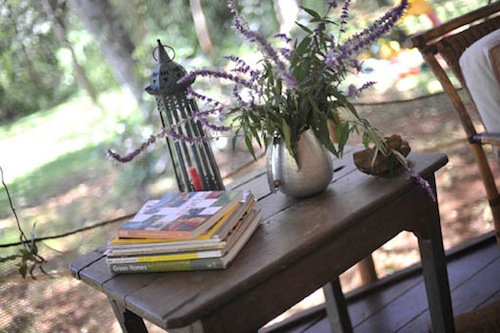
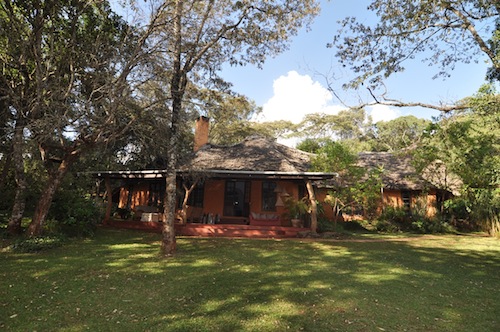


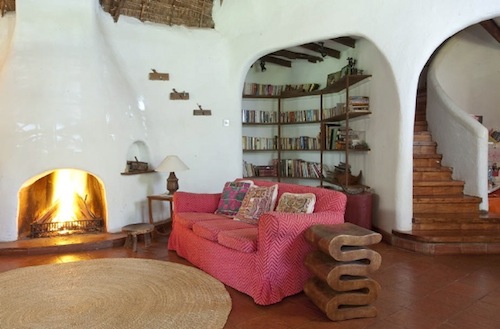
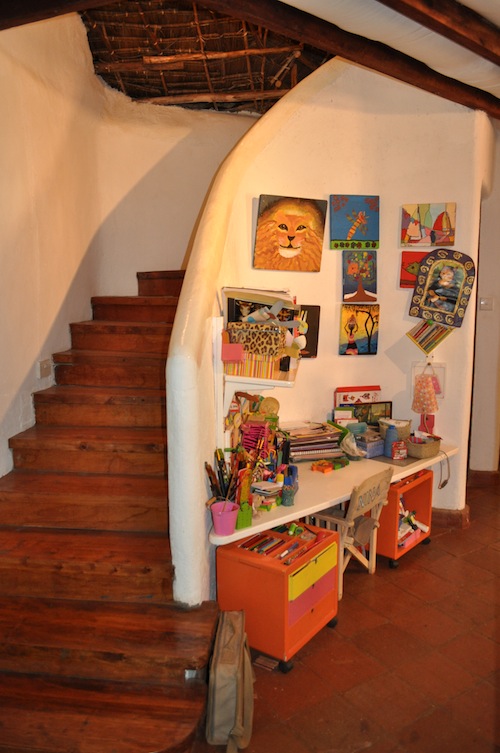
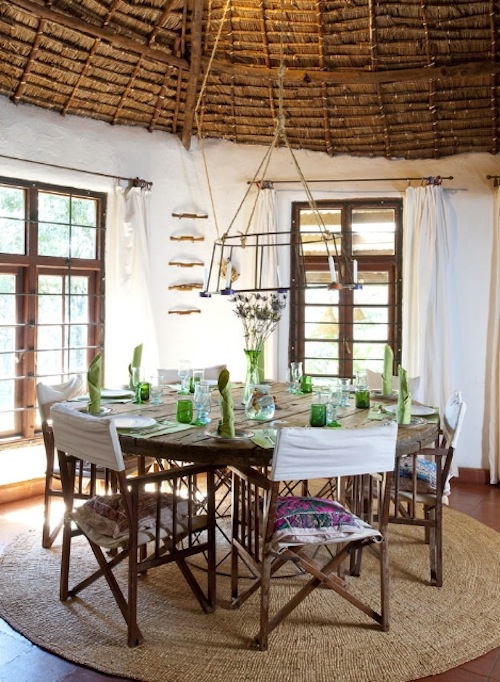


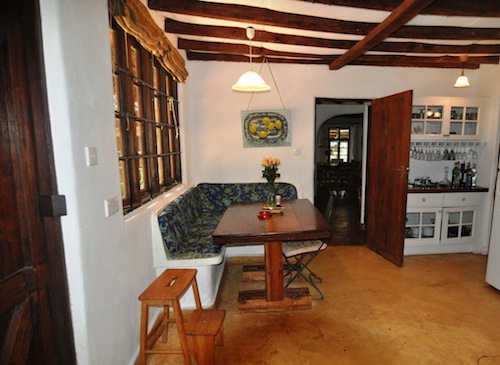
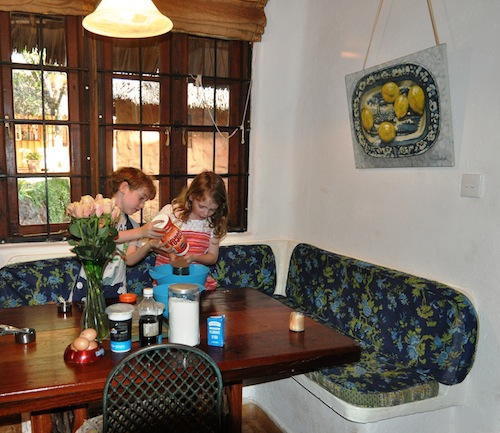
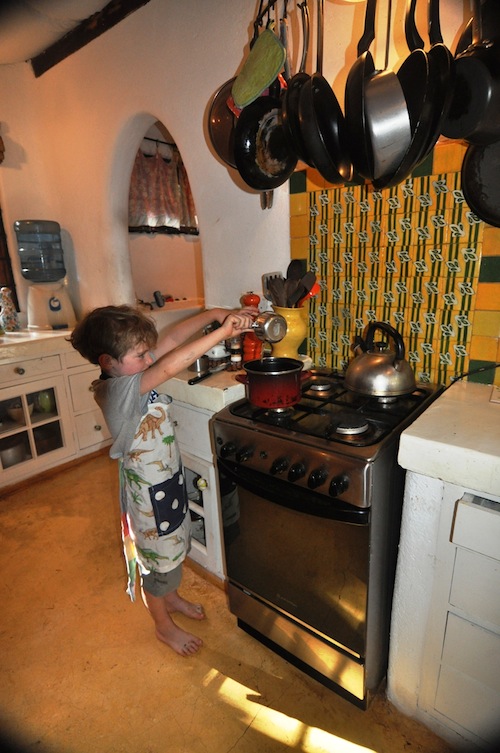
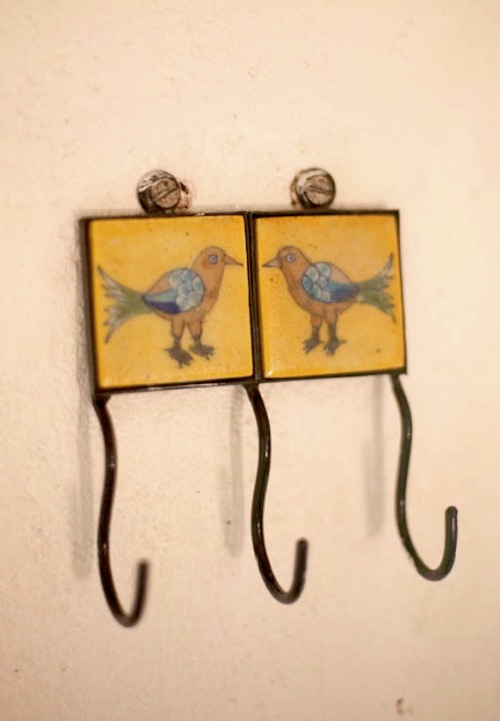

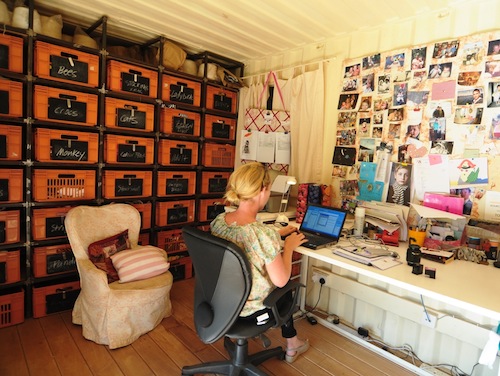
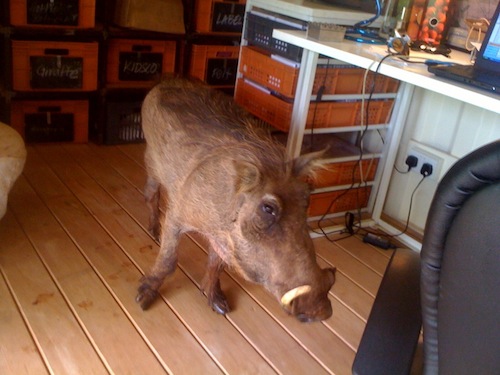
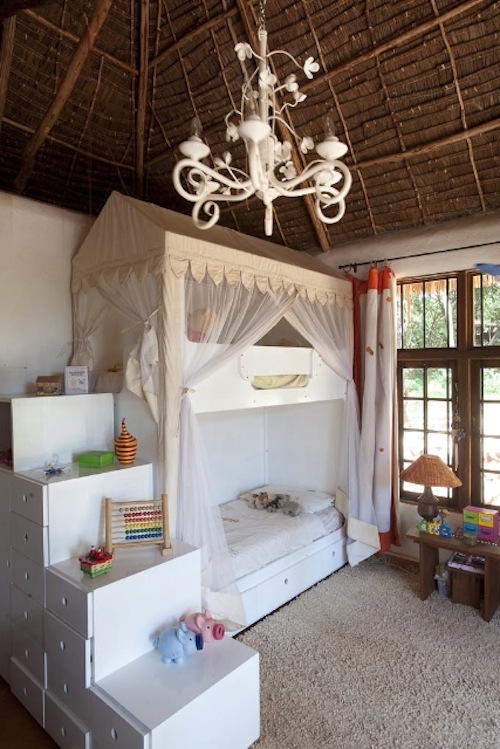
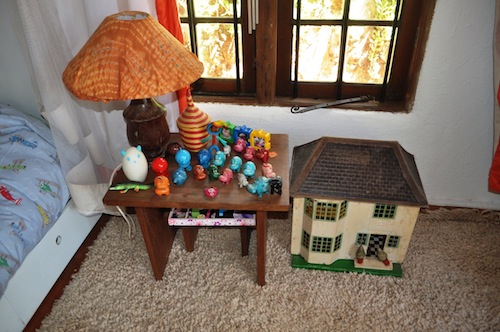
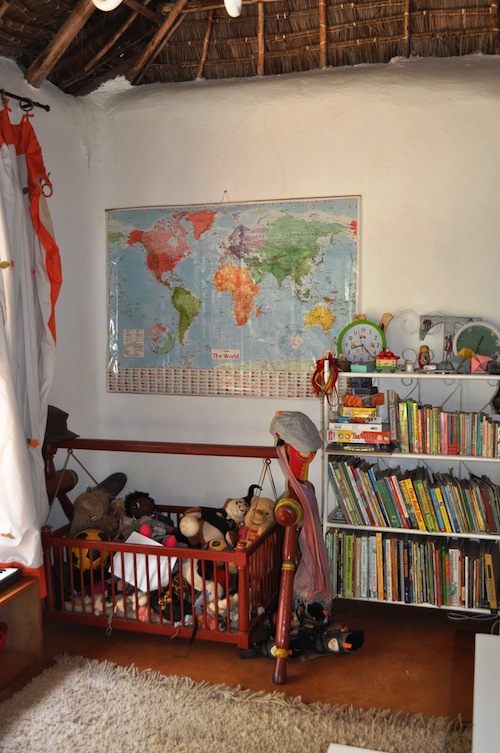
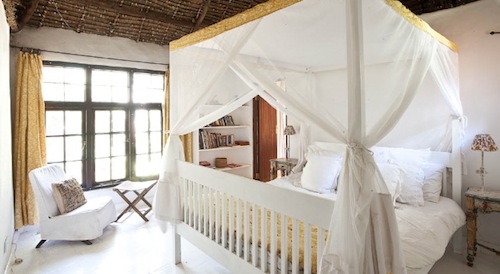
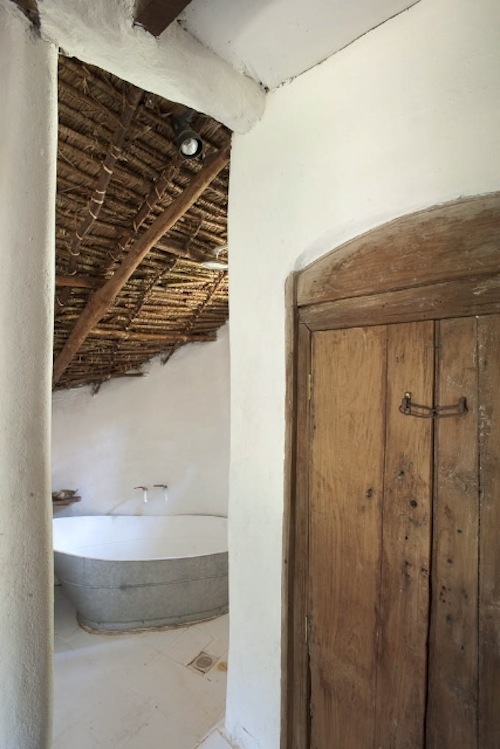
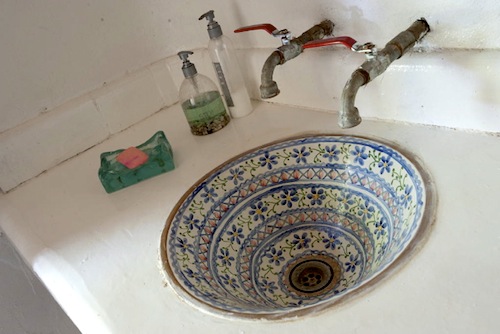


you guys have it so right. your kids will know, refer and remember .
now, need to check with jan re Sebastiano tent. swamped with inquiries.
Hi Erin , I believe that I have met you through Dianne and Sebastiano when you were visiting San Francisco..? Much of your stories remind me of Indonesia, where I grew up in the 40’s. The closeness of family, the interdependency, dedication and affection of natives, the sense of adventure and overpowering connection with nature. All leaving your mind to roam and give creativity free range so you can contribute in your own way. Some of this will always stay with you and your sweet little family. Happy trails.., Pauline